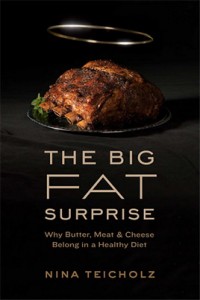Fat is bad

THE BIG FAT SURPRISE Why Butter & Cheese Belongs in a Healthy Diet BY NINA TEICHOLZ
Going from bad to good, butter, meat and cheese are a part of a healthy diet, according to an an investigative American journalist.
Nina Teicholz, author of the book The Big Fat Surprise, makes the argument on her website that modern nutrition science over the past 60 years has been wrong about dietary fat. She is making a groundbreaking claim that more, not less dietary fat including saturated fat leads to better health, wellness and fitness and people should welcome these “whole fats” back into their lives.
But according to Windsor family doctor Lynda Hammond, there is a well-established link between fat intake and heart disease and stroke risk.
“Diets which are rich in saturated fat and trans fat raise blood cholesterol level, which leads to clogged arteries that block the flow of oxygen-rich blood to the heart and brain,” she said.
Hammond explained that there are two type of fats, good fat and bad fat, otherwise known as called trans fat. Good fats are an essential part of a healthy diet and are a great source of energizing fuel. Trans fats have no known health benefits and there is no safe level of consumption.
Hammond also said that people usually do not know how much fat should be eaten, or how to avoid artery-clogging trans fat.
“The type of fat you eat is very important,” said Hammond. “The average 1,800-calorie diet should have between 40 and 65 grams of fat per day.
Vitamins A, D, E, and K are fat-soluble vitamins, meaning that the fat in foods helps the intestines absorb these vitamins into the body. Fat also provides essential fatty acids and keeps skin soft.”
Surjeet Babbar, a dietician in Windsor, said a saturated fat is a bad fat, which is found in full-fat dairy products and meat. Saturated fat should not be consumed in more than 10 per cent of your total calories per day.
“High intake of bad fat can increase cholesterol levels which may be a risk heart diseases,” said Babbar.
“The main sources of your dietary fat should be oils, nuts, seeds and fatty fish which is good fat,” he said. “Unsaturated fat is found in oils like olive, canola, sunflower. It is recommended to take at least two to three tablespoons of good fat.”
Eating unsaturated fat instead of saturated or trans fat can help lower your cholesterol levels and decrease your risk of heart disease.
Hammond said it is important to include good fats every day. It is also vital to meet the daily need for essential omega-3 and omega-6 fats. Omega-6 fat is easy to get since it is found in all types of oil. A diet should contain fatty fish, canola oil, flax, walnuts and omega-3 enriched products like milk, cheese and eggs.
Research from the Harvard School of Public Health indicates that trans fats can harm health in even small amounts. For every two per cent of calories from trans fat consumed daily, the risk of heart disease rises by 23 per cent.
Foods containing fat can be part of a healthy diet but experts say to eat the right ones. Monounsaturated fats like almonds and avocados and polyunsaturated fats like walnuts and fish are really good for health, whereas trans fats found in fast food like fries and packaged foods like cake mixes should be avoided at all costs.
According to CBC, people might be puzzling over this new theory about The Big Fat Surprise and rethinking their eating habits, most experts do not think of the book as controversial.
They just think its advice is flat-out wrong.


